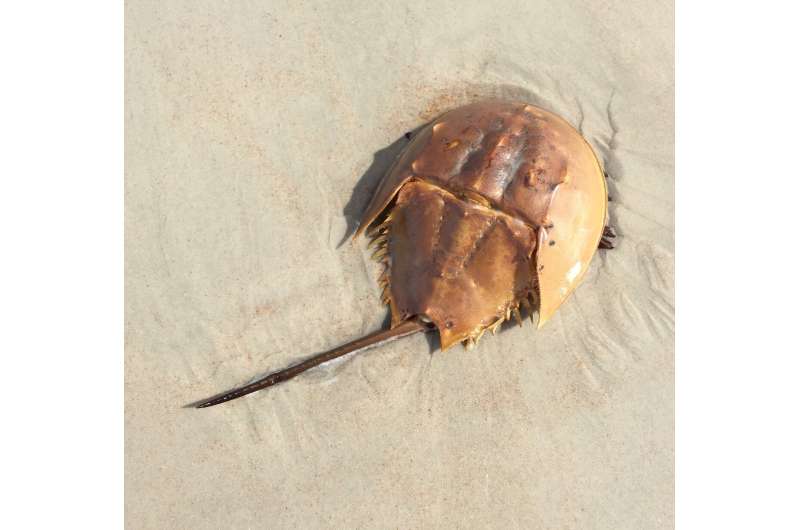This article has been reviewed according to Science X's editorial process and policies. Editors have highlighted the following attributes while ensuring the content's credibility:
fact-checked
reputable news agency
proofread
Court order halts horseshoe crab harvesting on many South Carolina beaches, protecting red knots

Dozens of critical habitat areas for threatened shorebirds will be protected after a U.S. District Court in Charleston handed down an order prohibiting three groups from harvesting horseshoe crabs on several of South Carolina's beaches this season.
Red knots—a threatened migratory shorebird—depend on horseshoe crab eggs for survival, each one fueling up on hundreds of thousands of the arthropod eggs in South Carolina on the way to the Canadian Arctic, according to previous reporting by The State Media Co.
But when horseshoe crabs are taken from the beaches red knots flock to, harvested for the benefit of pharmaceutical companies that use the crabs' blue blood to detect bacterial toxins, it removes the red knots' food source. Companies in Europe and Asia have switched to using a synthetic copy of the ingredient, which does not require horseshoe crabs to be captured or bled, The State Media Co. reported.
On Thursday, an order signed by United States District Judge Richard Mark Gergel puts a pause on horseshoe crab harvesting for three opposing groups that applies to nearly 30 beaches in South Carolina. The order lasts through the spawning season, which begins March 15 and ends June 15. The beaches listed have been identified by the U.S. Fish and Wildlife Service and the state Department of Natural Resources as critical habitat areas for red knots.
"It is the most significant kind of protection for red knots and horseshoe crabs that's ever been put in place on the Eastern Seaboard," said Catherine Wannamaker, an attorney with the Southern Environmental Law Center.
Part of the order also restricts placing female horseshoe crabs into containment ponds, which hold the taken arthropods before they are bled by pharmaceutical companies.
Charles River Laboratories, one of the defendants in the lawsuit filed by Defenders of Wildlife and the South Carolina Coastal Conservation League, is the only company harvesting horseshoe crabs in the state for biomedical purposes.
"It's really a double fold," Wannamaker said Saturday. "No. 1, no harvesting in the areas where red knots are stopping to feed. No. 2, wherever you find a female crab, you cannot take it to a containment pond because we don't want eggs laid in them."
Charles River Lab, Marsh Point Farms Inc. and Gault Seafood LLC are also "prohibited (from) purchasing, selling, placing in containment ponds, and biomedically processing any horseshoe crabs harvested" from the listed beaches during spawning season, the order says.
While the preliminary injunction stops Charles River contractors from harvesting on several beaches up and down the South Carolina coast, it does not limit taking horseshoe crabs from other areas, including marshes.
Samantha Jorgensen, Charles River spokesperson, said Saturday the company had "agreed to the resolution in the motion for a preliminary injunction," allowing it to continue its work by "protecting the health and safety of patients, as well as the security of the global biopharmaceutical supply chain."
Previously, Jorgensen said Charles River had worked with the South Carolina Department of Natural Resources for nearly 40 years to oversee the annual collection and release of horseshoe crabs.
The company is "committed to collecting this natural resource in a safe and humane manner that is both environmentally sustainable and ensures medical treatments are safe for patients," Jorgensen said.
Part of the Thursday order stipulates that Charles River and its contractors need to certify that the horseshoe crabs they do take are not from the restricted areas. Harvesters also must use GPS during harvesting and provide a record of all the places they took the horseshoe crabs. Beginning April 21, those records will be sent weekly to SCDNR, Coastal Conservation League and Defenders of Wildlife.
SCDNR's fishery staff is working to "write and distribute a new set of permits reflecting the updated conditions" as laid out in the order, said agency spokesperson Erin Weeks on Saturday.
A status conference will be held July 1 to evaluate the effectiveness of the order and to discuss final resolution of the action, according to the filing.
For environmentalists, the district court's order is the second victory in less than a month in protecting red knots and horseshoe crabs. In mid-March, the U.S. Fish and Wildlife Service released a draft compatibility determination that found horseshoe crab harvesting was not in line with the intended purposes of Cape Romain National Wildlife Refuge. The draft currently pauses harvesting on the entire 66,000-acre refuge.
According to the order, Charles River, Marsh Point and Gault Seafood are not allowed to harvest horseshoe crabs from the following beaches from March 15 to June 15.
Restricted beaches:
- North Cape Island Beach
- South Cape and Lighthouse Island beaches
- Raccoon Key Complex and White Banks beaches
- Marsh Island
- Bulls Island Beach
- Capers Island Beach
- Dewees Island Beach
- Isle of Palms Beach
- Sullivan's Island Beach
- Folly Beach
- Bird Key Stono
- Kiawah and Seabrook Island beaches
- Deveaux Bank
- Edisto Island beaches
- Pine and Otter Island beaches
- Harbor and Hunting Island beaches
- Fripp Island Beach
- Hilton Head Island Beach
- Daufuskie Island Beach
- Turtle Island Beach
- Jones Island Beach
- Cape Romain National Wildlife Refuge
- Bay Point Island and Bay Point Shoal
- Little Capers Island
- North Island
2023 The State
Distributed by Tribune Content Agency, LLC.


















